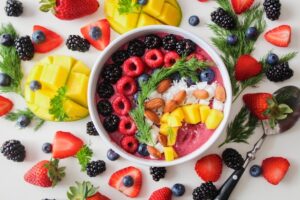Are you feeding your child the right foods for academic success?
A large body of research shows that maintaining a healthy, balanced diet is crucial in making sure your child is performing at their maximum potential. The right nutrition can improve your child’s cognitive capability, brain capacity and academic performance. A diet that consists of too much junk food decreases your child’s brainpower — by limiting the amount of information to the brain. As a parent, you have a responsibility to ensure your child has a healthy diet, one that maximizes their potential and keeps them able to retain and recall information with speed and proficiency.
Here are 3 simple tips that can increase your child’s academic performance, by ensuring their diet is based around what is best for them:
Make sure they are drinking enough water
Hydration is particularly important for children, as they require more water in relation to their body weight than adults. Even mild dehydration can cause a lack of focus, irritability and fatigue. This means their academic performance, as well as their willingness to work, wi
l be negatively affected. Research has shown that access to extra water increases memory and attention in schoolchildren, and those who drink a glass of water before an exam are 10% more likely to get a higher grade than those who don’t. We recommend all children bring a bottle of water with them to our classes, as well as bring them to any examinations they attend. If you struggle to get your child to drink enough water in the day, try adding a slice of lemon/lime to their drink, or fill their bottles up with sugar-free squash/cordial. You could even buy your child a Fruit Infuser Water Bottle, to make it exciting to make and try new flavours.

Make sure they are getting all of their vitamins/minerals
Vitamins and minerals are a crucial element of your child’s dietary needs. The body does not produce a sufficient amount of many vitamins itself — this means it is your responsibility as a parent to ensure your child is receiving adequate amounts from diet and/or supplementation. Deficiencies in vitamins and minerals can negatively affect cognition, memory, perception, intuition and reasoning skills of children. It also directly influences your child’s behaviour and test performance. Ideally, your child should be getting their vitamins from a balanced, healthy diet – one that includes dairy, protein, whole grains and fresh fruit and vegetables. However, if your child consumes a highly selective diet, or has a poor appetite/erratic eating habits, it is worth investing in multivitamin supplements. There are many flavoured and chewable multivitamins available if your child has any difficulty or reluctance swallowing tablets.
Understand the benefits of OMEGA-3s
Research has shown that supplementing your child’s diet with fish oils is an effective way to raise his/her IQ levels. John Protzko, from New York University, found that OMEGA-3 supplementation can boost a child’s IQ measures by more than 3.5 points! The likely mechanism behind the beneficial effects is that it supplies essential fatty acids that serve as building blocks for nerve cell development – building blocks that the body cannot produce on its own. Fish oils should be taken for some time before exams take place; we recommend starting them as soon as possible. Just like the multivitamins discussed previously, fish oils can be found that are specifically formulated for children, flavoured and easy to implement as part of their daily routine.
Follow the tips above to ensure you are feeding your child the right foods to aid in their learning. Diet has an enormous effect on your child’s behaviour, memory and learning capacity. Try to include all the necessary food groups, vitamins/minerals, fatty acids and water intake through a healthy balanced diet. Supplementation can be an easy way to make sure your child receives what they need to reach their academic potential.
At our weekly classes, and half-term intensive courses we recommend all our students bring a bottle of water with them, a healthy and balanced lunch and/or snack (nut-free as some students have an allergy) and recommend a piece of fruit, maintaining a no-junk-food policy. This means your child will perform at their best and maintain focus throughout all lessons.
